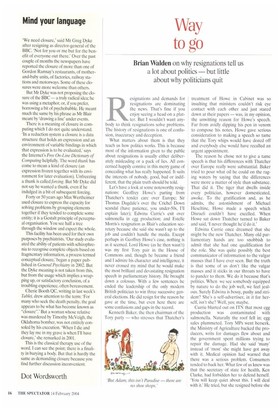Mind your language
'We need closure,' said Mr Greg Dyke after resigning as director-general of the BBC. 'Not for you or me but for the benefit of everyone out there.' Over the past couple of months the newspapers have reported the closure of more than one of Gordon Ramsay's restaurants, of motherand-baby units, of factories, railway stations and motorways. Some of these closures were more welcome than others.
But Mr Dyke was not proposing the closure of the BBC — a truly radical idea; he was using a metaphor, or, if you prefer, borrowing a bit of psychobabble. He meant much the same by his phrase as Mr Blair meant by 'drawing a line' under events.
There is a meaning of closure in computing which I do not quite understand. 'In a reduction system a closure is a data structure that holds an expression and an environment of variable bindings in which that expression is to be evaluated,' says the Internet's Free On-Line Dictionary of Computing helpfully. The word thunk has come to mean a kind of closure (an expression frozen together with its environment for later evaluation). Unfreezing a thunk is called forcing. But Mr Dyke did not say he wanted a thunk, even if he indulged in a bit of subsequent forcing.
Forty or 50 years ago Max Wertheimer used closure to express the capacity for solving problems by grouping elements together if they tended to complete some entity; it is a Gestalt principle of perceptual organisation. You see half a tree through the window and expect the whole.
This facility has been used for their own purposes by psychiatrists. 'Our study evaluated the ability of patients with schizophrenia to recognise complete objects based on fragmentary information, a process termed conceptual closure,' began a paper published in General Psychiatry in 2002. But the Dyke meaning is not taken from this, but from the usage which implies a wrapping up, or satisfactory conclusion, of a troubling experience, often bereavement.
Cherie Booth QC, writing in last week's Tablet, drew attention to the term: 'For many who seek the death penalty, the goal appears to be what has become known as "closure".' But a woman whose relative was murdered by Timothy McVeigh, the Oklahoma bomber, was not entirely consoled by his execution. 'When I die and they lay me in my grave is when I'll have closure,' she remarked in 2001.
This is the classical therapy use of the word. I can see the point; there is a finality in burying a body. But that is hardly the same as demanding closure because you find further discussion inconvenient.
Dot Wordsworth


































































 Previous page
Previous page